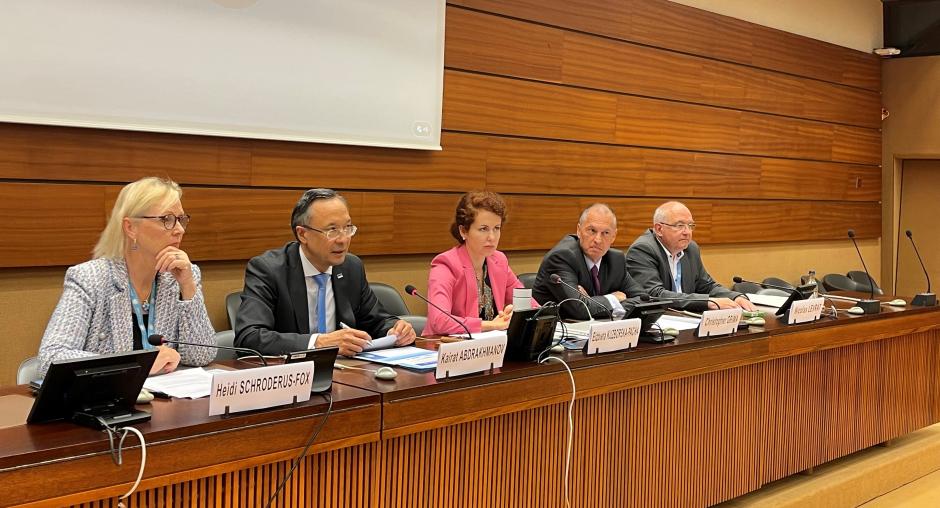Expert roundtable in Geneva explores need to build peace and prevent conflict with the help of minority youth

Experts and participants gathered at the United Nations Office in Geneva on 13 May to explore the importance of Promoting Conflict Prevention and Building Peace through the Socio-Economic Inclusion of Minority Youth. The event attracted representatives of the UN Member States, non-governmental organizations and youths and was a joint initiative of the OSCE High Commissioner on National Minorities (HCNM) Kairat Abdrakhmanov; Permanent Representative of Malta to the United Nations Office in Geneva Christopher Grima, representing the 2024 OSCE Chairpersonship of Malta; and the UN Special Rapporteur on Minority Issues Professor Nicolas Levrat.
The UN Office in Geneva provided the perfect backdrop to discuss measures and policy approaches set out in the Recommendations on the Effective Participation of National Minorities in Social and Economic Life (Socio-Economic Recommendations) and place them in the context of the UN Sustainable Development Goals and other UN frameworks that empower youth in peacebuilding and conflict prevention settings. The roundtable also built on discussions held at two previous events, in 2021 and 2023, at the UN Office in Geneva about the Effective Participation of Minorities in Economic Life as a Strategy for Conflict Prevention.
Long-term peace requires resilience and commitment from the next generation. As Ambassador Grima stated: “[It is only] by ensuring the broadest possible participation of young people within our communities, and recognizing them as invaluable contributors to addressing the challenges which confront us, that we can realistically start to ensure the long-term stability and security of the OSCE region and beyond.”
Minority youths in particular can play a key role in building strong, inclusive societies and, in so doing, minimize the risk of conflict. As outlined by High Commissioner Abdrakhmanov, “At the heart of our discussion today is a strategic vision to prioritize youth from minority communities. This is not just a visionary step; it is a necessity for building resilient, prosperous and harmonious societies. In my view, youth should be mobilized as key actors of change who can contribute towards building less fragile and more peaceful societies. Focusing on youth allows us to address the root causes of marginalization and exclusion.”
UN Special Rapporteur on Minority Issues Levrat elaborated further, stating: "It is of utmost importance that the role of youth belonging to minorities be acknowledged in the Pact for the future, so that their essential and major contribution for the development of societies promoting diversity as a central value for building peaceful, inclusive and stable societies be recognized."
Ambassador Heidi Schroderus-Fox, Permanent Representative of Finland to the United Nations Office in Geneva, and representing the incoming OSCE Finnish Chair, noted that “As we move forward, it is crucial that we broaden the avenues for young people to participate meaningfully in peacebuilding initiatives. By doing so, we not only enhance their trust in national and international institutions but also empower them to take ownership of the processes that shape their lives. To this end, Finland emphasizes the need for diversity and inclusivity in engaging youth. We must reach young people from all walks of life, from different minorities and prioritize gender diversity. Special attention should be paid to those in vulnerable positions, including persons with disabilities.”
The entire expert panel, which was moderated by HCNM Senior Legal Adviser Elzbieta Kuzborska-Pacha, comprised of Oliver Scicluna, Special Representative of the OSCE Chair-in-Office on Youth; Hernan Vales, Chief of the UN High Commissioner for Human Rights (OHCHR) Indigenous Peoples and Minorities Section; Fatuma Abdillahi Ali, Office of the High Commissioner on Human Rights Senior Minority Fellow; and Andreea Cârstocea, Senior Researcher, the European Centre for Minority Issues. Their contributions will inform the future work of the HCNM as well as the other delegates and participants.
